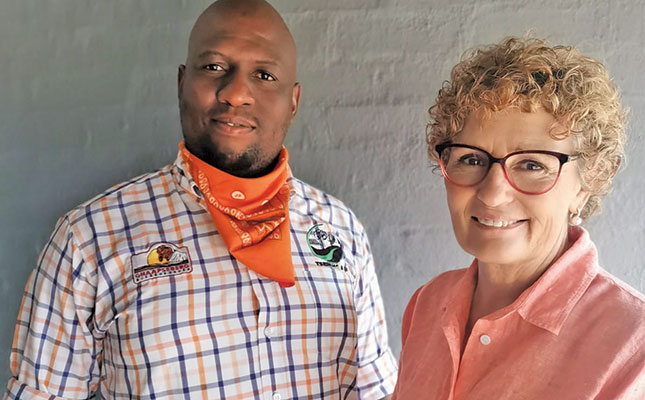The Boer goat mentor who’s changing lives
- Get link
- X
- Other Apps
By Annelie Coleman
Stud Boer goat breeder Desré Ferreira from Vryburg in North West provides a valuable support network to developing and commercial Boer goat farmers. She started mentoring a group of about 30 farmers a decade ago, and now supports 150.

Vryburg-based farmer Desré Ferreira bought her first 25 Boer goat ewes and a ram in 1996, and these formed the nucleus of her Molopo Boer Goat Stud.
“I had to generate an income for myself and decided on stud breeding because of the added value this type of farming business offers,” recalls Ferreira.
“It costs virtually the same to raise a commercial animal as a stud animal, but the return on investment is higher. And that’s the objective of my mentoring programme: I want to help the breeders in my group become commercial goat breeders and eventually even stud breeders.”
This involves showing them how to run their herds in a sustainable and profitable manner.
“The proper management of a goat flock is an intricate affair, and breeders need leadership and information to manage their herds cost-effectively in the long term,” she says.
“This calls for a multidimensional approach that covers all aspects of practical goat breeding, from animal husbandry and health to nutrition and economics.”
Ferreira sees herself first and foremost as a ram breeder. But selling rams doesn’t only mean money in her pocket; she tries to keep track of each animal’s performance after she has sold it.
A breeding ram is, by far, the most expensive animal in a flock of goats, and it is important to obtain as much worth as possible from it, she says.
The making of a mentor
Ferreira’s initial contact with buyers made her realise the need for a support network for new Boer goat farmers, so she compiled a management manual based on the difficulties experienced by the Boer goat farmers she had mentored.
Her aim was to address as many of the issues as possible in an uncomplicated, practical way.
“Over and above helping them to improve their herds, my aim was to teach these farmers to think of their concerns as businesses that need to generate a profit to survive, especially as far as the rams are concerned.”
Ferreira says she also had to go through a steep learning curve when she started stud breeding. Animal health, for example, is always a major challenge, and many farmers new to the business do not understand the importance of sound animal health management practices.
For this reason, Ferreira teaches her mentees the crucial role of sound animal selection and the importance of a health protocol.
“The rams earmarked for the extensive conditions in the areas where most of these farmers live should be robust and adaptable,” she says.
Animal health
In order to get the optimal value from a ram, it should be cared for meticulously and not merely left with the ewes in the hope that it will perform well. This is why Ferreira’s mentoring programme pays so much attention to regular vaccinations and dosing against endo- and ectoparasites.
Ectoparasites and the diseases they cause can have a severe impact on profitability, but treatment against endoparasites such as tapeworm and roundworm is equally important.
For tapeworm, the goats should be treated monthly from two months until the age of seven months.
For roundworm, they need to be treated two weeks after the first spring rain, one month before the start of the breeding season, and one month before lambing. Breeders should constantly be on the lookout for roundworm infestation.
Infected animals may show anaemia, stunted growth and swollen throats, and may have poor coats and diarrhoea.
“In my experience, few farmers keep records about health requirements and treatment; most treat the animals only when needed,” says Ferreira.
“A lack of knowledge about basic breeding principles also keeps many farmers back. The ratio between rams and ewes is a particular problem. The number of ewes a ram can service successfully in a single mating season and the period a ram should be kept in a specific flock should also be well understood.
“I’ve come across breeders who believe that one ram is capable of servicing up to 100 ewes, but the most efficient ratio is one ram to 35 ewes,” notes Ferreira.
No fences
Running a flock of goats in an unfenced communal area presents a breeder with another set of problems: properly managing his or her animals among a multitude of others.
The shared grazing and watering sources leave animals open to disease, and rams have access to everybody else’s ewes.
Having a set breeding season of 2,5 months (from February onwards) under such conditions is very difficult. And young ewes should be put to the rams in May in order to lamb in October, which makes proper flock management even more difficult.
The best option for communal farmers, says Ferreira, is to keep the rams kraaled during the breeding months and allow the ewes to overnight in the kraals.
Records are essential
A lack of proper record-keeping and animal-performance recording prevents many breeders, and not only communal farmers, from realising the full potential of their animals.
mentorship programme teaches farmers about the positive consequences of keeping track of every aspect of their farming concerns, in great detail.
Good record-keeping provides a farmer with objective selection criteria to identify animals with superior qualities of economic importance.
Ferreira has designed a special booklet for her mentees to use as a guide for record-keeping.
“It covers issues such as the number of goats in the flock, dipping, dosing and vaccination dates, and mating. This makes record-keeping and herd management much easier.
“Knowing exactly what’s happening with the flock at any given time allows any livestock farmer, not only goat farmers, to pick up problems and identify opportunities in time.”
Expert advice
Ferreira adds that many of the farmers live very far from the nearest towns, so by keeping records, they can buy the necessary provisions, such as medication, when they go to town.
She makes use of WhatsApp to communicate with the farmers she mentors. At the moment, her group consists of 150 members, and the number is growing constantly.
Members often seek her advice in identifying an ailment, nutritional need and so forth from photographs of animals sent to her via the app.
Although Ferreira is a “one-woman show,” as she puts it, she is indebted to experts such as veterinarians, animal health consultants and animal nutrition specialists for helping her with the flow of enquiries from group members and other farmers.
Making a difference
The farmers under Ferreira’s wing hail mostly from North West, the Northern Cape, Limpopo and Gauteng. These breeders represent thousands of goats.
“I’ve seen a phenomenally positive change in the quality of the goats in our group since we started a decade ago,” she notes.
“The men and women taking part are motivated farmers and thirsty for knowledge. I’m especially impressed by the dedicated way in which they implement what they learn.”
Kehentse Mosimanyane, who with his wife Ophelia manages the Tsepamo & Co family business near Tosca in North West, says the most important lesson they learnt from Ferreira was that “measuring is knowing”.
They also learnt to control breeding seasons. “Controlled lambing seasons follows on from controlled breeding seasons,” Mosimanyane says.
“This has helped us with overall planning for vaccination programmes, nutritional supplements, and the efficient methods of nurturing lambs from pre-birth until they’re introduced to the production cycle.”
Since joining the group, the Tsepamo & Co flock has improved markedly in terms
of fertility and efficiency. The couple continually selects the most genetically fertile ewes which, in turn, improves conception rate. This resulted in exceptional kidding rates of 160% in 2020.
“Every young enterprise or business needs a mentor who has excelled in his or her line of trade and, in our case, Desré has added value to our business,” says Mosimanyane.
“This is underpinned by the excellent prices we realised at the recent Ghaapseberg [Boer Goat Group] production sale.
“One of our young ewes, for example, sold for R5 000.”
Phone Desré Ferreira on 083 440 9309, or Kehentse Mosimanyane on 073 022 5647.



Comments
Post a Comment